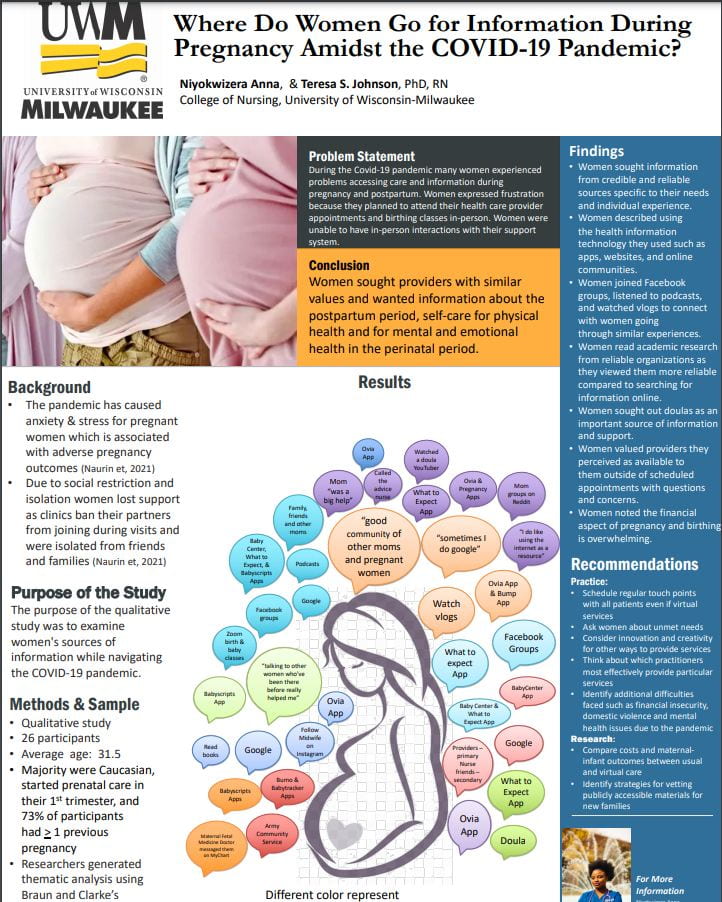Niyokwizera Anna, “Where Do Women Go for Information During Pregnancy Amidst the COVID-19 Pandemic?”
Mentor: Teresa Johnson, Nursing
During the COVID-19 pandemic many women experienced problems accessing care and information during pregnancy and postpartum. They had questions about their body, the pregnancy process, and how to care for their baby. Women expressed frustration because they planned to attend their health care provider appointments and birthing classes in-person. Women were unable to have in-person interactions with their support system. The purpose of the qualitative study was to examine women’s sources of information while navigating the COVID-19 pandemic. Participants were recruited via social media platforms, local clinical locations and word of mouth. Interviewers with clinical obstetric experience conducted semi-structured interviews via Zoom. Questions focused on information needs and how the women handled their pregnancy during the pandemic. Individual participants were asked to identify sources used and what information was important to them. Researchers generated thematic analysis using Braun and Clarke’s method. Twenty-six women participated with average age of 31.5, majority were Caucasian and started prenatal care in their first trimester, and 73% of participants had > 1 previous pregnancy. Participants pursued diverse information pertaining to pregnancy and childbirth. Women sought information from credible and reliable sources specific to their needs and individual experience. Once interviewers were analyzed, women described using the health information technology such as apps, websites, and online communities. Women connected with women going through similar experiences through Facebook groups, podcasts, and vlogs. Women read academic research from reliable organizations as they viewed them more reliable compared to searching for information online. Women sought out doulas as an important source of information and support. Women valued providers they perceived as available to them outside of scheduled appointments with questions and concerns. Women sought providers with similar values and wanted information about the postpartum period, self-care for physical health and for mental and emotional health in the perinatal period.
Click the thumbnail below to open the full sized poster in a new tab.

Such an important topic that many are struggling with right now. As mentioned in your recommendations under the research sub-heading, I wonder how healthcare providers can help their patients find reliable information in a proactive way in order to help prevent the spread of misinformation. It is hard to displace those scary thoughts once they’ve been introduced!
Yes, it definitely is hard to changes ones perspective after the thought has already been formed. And I think the COVID-19 pandemic has shown us, where most people get their information from which is social media and the news which both are not always credible. Which creates a lot of misinformation. I think a way providers can help stop the spread of misinformation is simply to provide patients with examples of credible sources to stick to. And being available or having a forum where women can ask questions and get answers from providers outside of their clinical appointments.
Great job Anna. Really important concerns for women during the pandemic.
Thank you, Dr. Mkandawire-Valhmu.
Excellent work, Anna! The topic is so important and beautifully related to MCH!
Thank you Dr. Moerchen. MCH has been a blessing in my life as it has created a pathway for me and shown me where I want to go in the future.
Hello Anna! This is a very important topic for those mothers were are and will be pregnant during the pandemic. My question is what are the credible sources that these mothers are obtaining their information from?
Hello! The study focused primarily on where the women went to get their information. A lot of the women did not mention credible sources, only a small number of women did. But that could be a limitation of the study and future studies can examine if the women even know what a credible source looks like and where they can go to obtain those sources. So thank you for bringing that up.
well done!
Thank you Dr. Johnson for your support!
Anna – I look forward to seeing you use your innovation and creativity in the future to support all pregnant mothers. Well done on this beautiful poster.
Thank you Dr. Dietrich. I can’t express enough gratitude for the support I have received from you and MCH. It has honestly helped me grow as a person, as a nurse and opened a lot of opportunities for me.